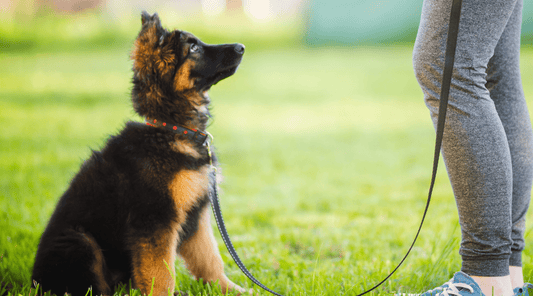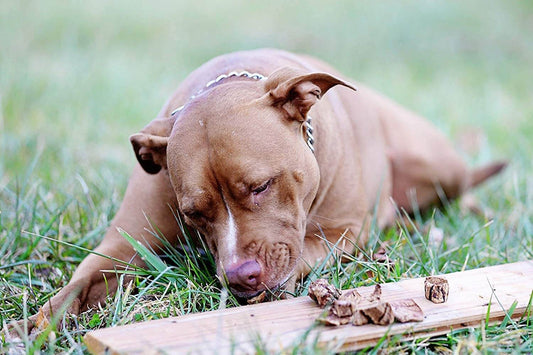Good Bones to Chew On: Soup to Safe — Best Bones for Dogs
Dawn Miller Jul 08, 20245 Minute ReadSitting in my garden admiring how fast my little cucumbers are growing, I'm looking forward to making some fermented pickles next month. In the background, I can hear the rhythmic gnawing of one of our 3 pups enjoying his Saturday afternoon.
That sound of contentment gets me thinking about the best dog bones and why I chose them. For me, safety is paramount. But I also want the treats I give my dogs to be healthy and fun to gnaw. They should also last a long time, even for my aggressive chewer lab mix, Bruno.
As a devoted pet mom, I've been through the ups and downs of pet care and childcare for that matter. My kids are now off at school. I've learned a thing or two about dog bones.
Is Chewing on Bones Good for Dogs?
Chewing is a natural behavior for dogs. In fact, if you don't give your dogs something to chew on, they'll find something suitable—as my walnut dining table leg and I found out years back. As gut-wrenching as it was to see my brand-new table leg mangled, it's just not fair to punish a dog for its natural instincts.
This normal dog activity keeps their jaws strong and their teeth clean. Gnawing on good bones for dogs to chew on can also help reduce anxiety and boredom. But not all bones are safe, which leads us to a critical point: What bones are good for dogs to chew on?
First things first, the benefits extend beyond keeping your pup busy or entertained. Dog bones are critical for dog health! So, a good dog bone is a health-promoting bone. It's an all-natural bone.
Chewing on safe bones for dogs prevents plaque buildup and can contribute to better breath. It's a bit like us humans brushing our teeth but much tastier for them, I suppose!
So, let's look at some types of dog bones you might consider and which dog bone may be the best option.
Free Marrow Refill Recipe Guide
Is It Good for Dogs to Chew on Uncooked Bones?
Raw bones do have some benefits. They are stronger than their cooked counterparts, making them less likely to shatter. But they also come with some safety risks—namely, my sweet boy dragging raw animal materials and related pathogens all over my yard or house and licking my face after. This was especially a no-no when my kids were still in the house.
That said, raw bones also contain some key nutrients that all good dog bones should have, such as collagen (which is a protein), glucosamine, and chondroitin. They also have more flavor. So, can dogs eat bones that are raw? Definitely! But I did a little digging of my own and would argue there's an even better option. I'll share it in just a minute.
Is Chewing on Store-bought Bones Good for Dogs?
Speaking of safety, store-bought bones often come with their considerations. While they're convenient, not all are created equal. I make sure to select the best bones for dogs that are natural and free from additives or preservatives. By natural, I mean "natural for dogs", not ones made of wood pulp or similar things dogs don't want to chew on unless they have to.
Synthetic bones upset my dogs' tummies, so they're also off the menu. Who thought it was a good idea to give our best furry friends microplastics as a snack? Rawhide is also out because it often contains a lot of extra chemicals.
When I buy dog bones, I prefer real, all-natural bones. Beef bones are best because they have the right hardness (not too hard) and size.
And when I can find them, I choose grass-fed beef bones because I've looked at nutrition research. Grass-fed beef has much more heart, brain, and skin-healthy polyunsaturated fat plus additional vitamin A and vitamin D. It's also lower in saturated fat.
When I give my dog a real bone from grass-fed cattle, I'm giving them the nutritious choice.
Is it Good or Bad for a Dog's Teeth to Chew on Bones?
Dogs use bones—or the nearest table leg—to massage their gums and remove plaque. Reducing plaque buildup keeps the gums healthier as they age, lowering their risk of tooth decay and loss.
Researchers in one study gave a group of 63 dogs real cow femur bones. They found a 35.6% decrease in plaque in just 3 days and 70.6% over 12 days. They also reported no adverse events (e.g., cracked or lost teeth, intestinal obstruction, etc.).
I find it a little impractical to brush my dogs' teeth, so this is a close-second choice for mouth hygiene.
With that said, bone density matters. The bone shouldn't be too soft. Chicken and turkey bones and even high-temperature cooked beef bones can fall into this category. Because the dog bone is soft, it can splinter and break apart. The dog will swallow the pieces. Then, they can pierce or block the digestive tract. This may require surgery.
Bones also shouldn't be too hard. A slow, low-temperature cooking process can get them to the right density while retaining the meaty bits and bone marrow your dog wants.
Are Soup Bones Good for Dogs to Chew On?
Soup bones can be a great choice. You can visit your butcher and ask for some marrow bones. These are the ones I use for my beef bone broth.
But, personally, I'm not comfortable with the risks. If I cook them long enough to make bone broth, they're generally too soft for my dog to chew on. Besides, the bone marrow is one of the reasons dog bones are so good for our furry friends.
So, at the end of the day, I'd rather leave it to experts who know how to slow and low cook the bones to retain the health benefits while making them safe for dogs to chew on.
Best Bones to Chew On
Now, I'll share some of my favorites and why we love to order each month in my house.
Healthy Bones for Dogs
When I think of healthy bones for dogs, I'm looking for beef marrow bones. They check all of my healthy dog treat boxes. When I can find them, I want to get grass-fed, USA-raised beef bones.
Safe Bones for Dogs
Beef marrow bones are also a safe choice when they have been slow and low cooked to retain the meaty bits while eliminating pathogens I don't want to be dragged around my house. To ensure safety, I choose these bones over here.
Best Bones for Dogs Who Are Small
Small dogs have unique needs. They won't be able to get their jaws around a mammoth-sized bone. So, if you have a small dog, try these.
Best Bones for Aggressive Chewers
Aggressive chewers also have unique needs. If they gnaw too hard, they break the bone into fragments that can lodge in the throat or intestines. The dog bone must be big enough and not too soft. If you have aggressive chewers in your home like I do, then you won't be disappointed by this meaty mammoth bone.
Available On:
Disclosure: This article may contain affiliate links, which means we may earn a small commission if you make a purchase through these links—at no extra cost to you. We only recommend products we trust and believe will benefit you and your K9.






